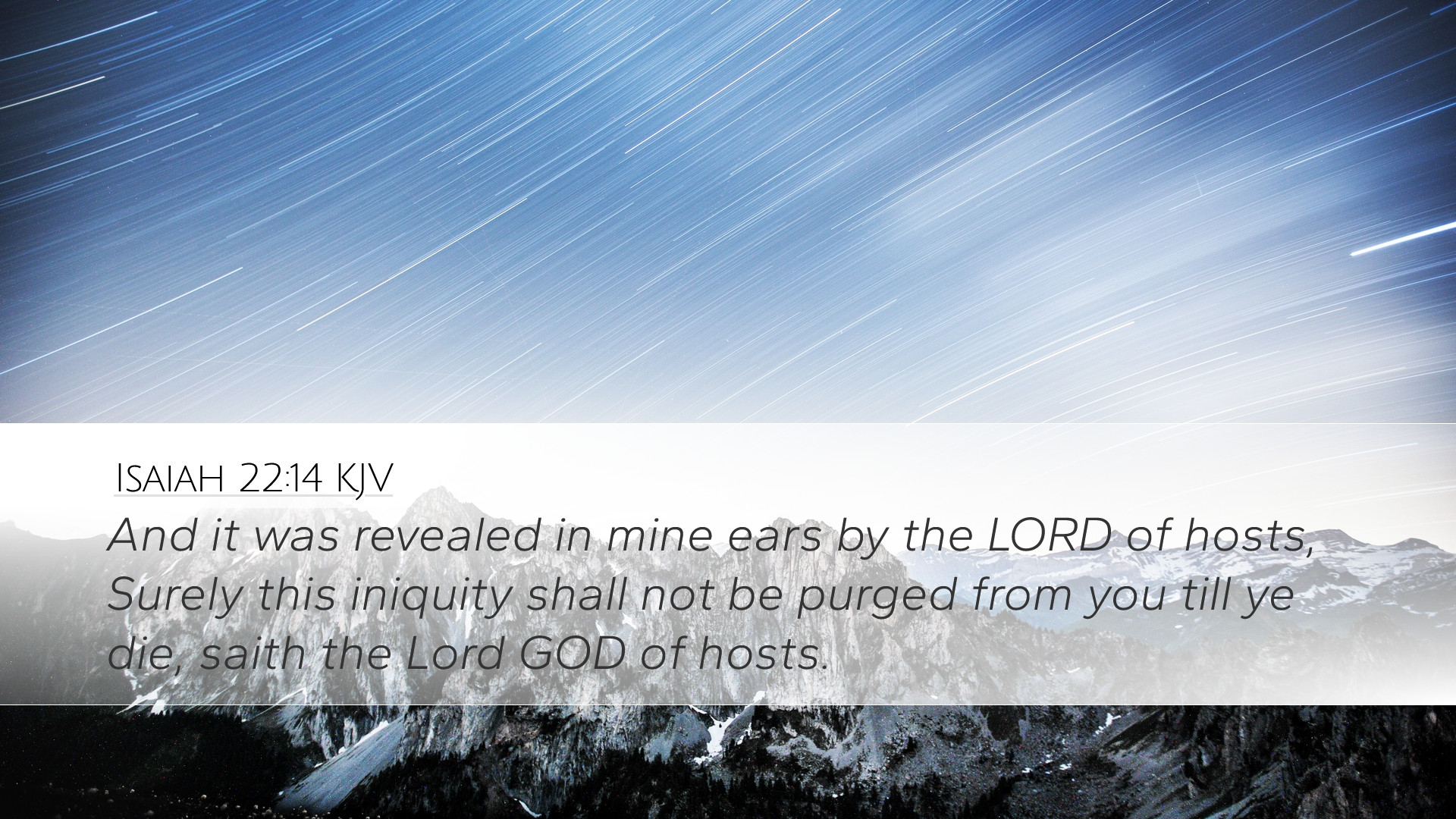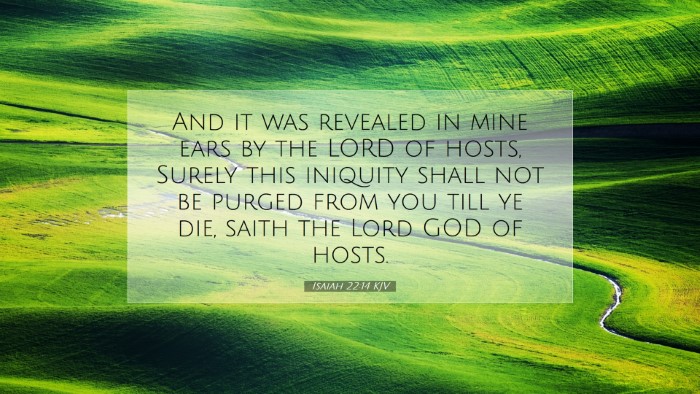Commentary on Isaiah 22:14
Verse Context: Isaiah 22:14 states, "And it was revealed in mine ears by the Lord of hosts, Surely this iniquity shall not be purged from you till ye die, saith the Lord God of hosts." This verse comes in a broader context where Isaiah is prophesying about the coming judgment and calamity due to the people’s sins.
Overview of the Passage
This passage is a direct utterance of God, conveying the seriousness of sin and the irrevocable nature of divine judgment. It reflects the weight of iniquity that rests upon the people, emphasizing that their moral failures will not be overlooked.
Insights from Matthew Henry
Sin's Consequences: Matthew Henry emphasizes the solemnity of God's declaration. He notes that divine judgment is not capricious but rooted in the justice of God. The phrase "shall not be purged" signifies a permanent state of guilt, reflecting the dire consequences of unrepented sin.
Divine Revelation: Henry also highlights the role of divine revelation in understanding sin. God is not silent; He communicates the gravity of the situation. The message underscores the need for repentance and awareness of one’s spiritual condition.
Insights from Albert Barnes
Historical Context: Albert Barnes points to the historical backdrop during which Isaiah prophesied, noting that the people of Israel often turned away from God, leading to inevitable judgment. Barnes illustrates that such warnings were intended not just as condemnation but as a call to change.
Permanent Judgment: Barnes remarks on the phrase "till ye die," which he interprets as the finality of judgment for those who remain unrepentant. This invokes a sense of urgency for the listeners and serves as a fervent reminder that God's patience has limits.
Insights from Adam Clarke
The Nature of Iniquity: Adam Clarke examines the specific "iniquity" referenced, suggesting that it relates to the idolatry and unfaithfulness of the people. Clarke’s commentary delves into the implications of living a life detached from God's commandments, noting that such a lifestyle invites inevitable judgment.
The Role of Prophecy: Clarke also reflects on the prophetic nature of Isaiah's message, emphasizing that true prophets are tasked with delivering God’s messages, regardless of the discomfort it may cause. He suggests that Isaiah's warning is a divine call to repentance that should not be ignored.
Theological Implications
This passage is significant for understanding the nature of God’s justice. It elucidates the steadfastness of God’s word and the weight of sin. The declaration that iniquity cannot be purged signifies the seriousness with which God views unrighteousness.
- The Urgency of Repentance: This verse serves to remind believers of the immediate need for confession and repentance to avoid such a dire fate.
- God's Sovereignty: It reinforces the understanding of God’s sovereignty over judgment, illustrating that ultimate accountability lies with the individual.
- Hope in Prophecy: Despite the strong warnings, there remains hope for those who respond to God’s call, as prophets like Isaiah also conveyed messages of restoration.
Practical Applications
For modern believers, Isaiah 22:14 serves as both a warning and a lesson on the importance of alignment with God’s will. Pastors and teachers can draw from this verse to instill a sense of reverence regarding sin and its consequences:
- Encourage self-examination: Regularly reflect on personal and corporate faithfulness to God.
- Teach the nature of God’s judgment: Convey that while God is loving, He is also just and does not ignore sin.
- Promote a culture of repentance: Create avenues for confession and healing within the community of believers.
Conclusion
Isaiah 22:14 is a powerful reminder of the weight of iniquity and the urgency of repentance. By combining the insights from esteemed theologians, we understand its implications for both the historical audience and contemporary believers. This verse encourages all to pursue a faithful relationship with God, recognizing the seriousness of sin and the grace available through repentance.


